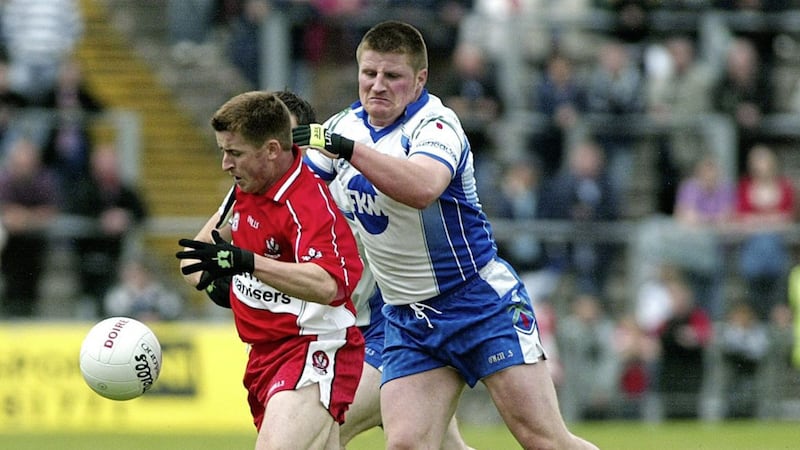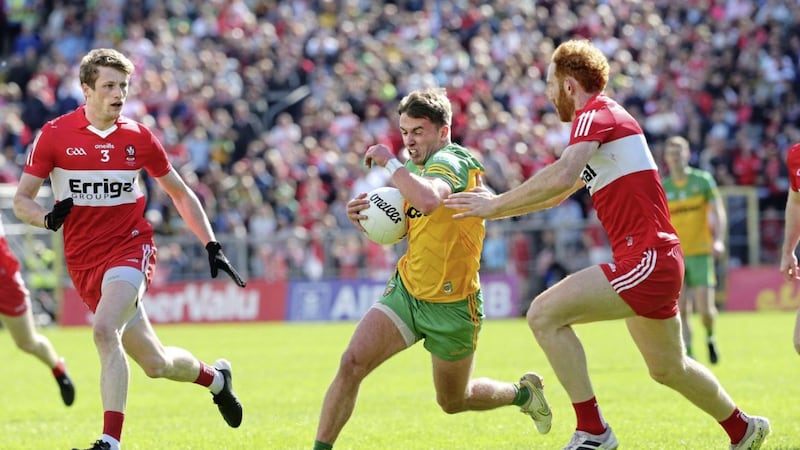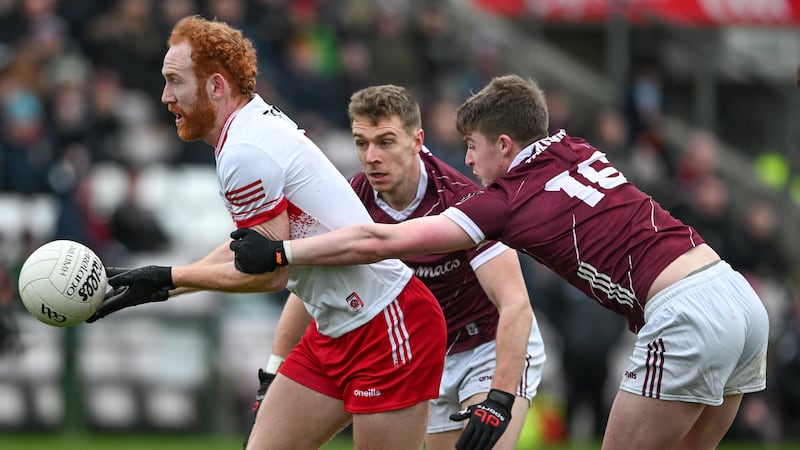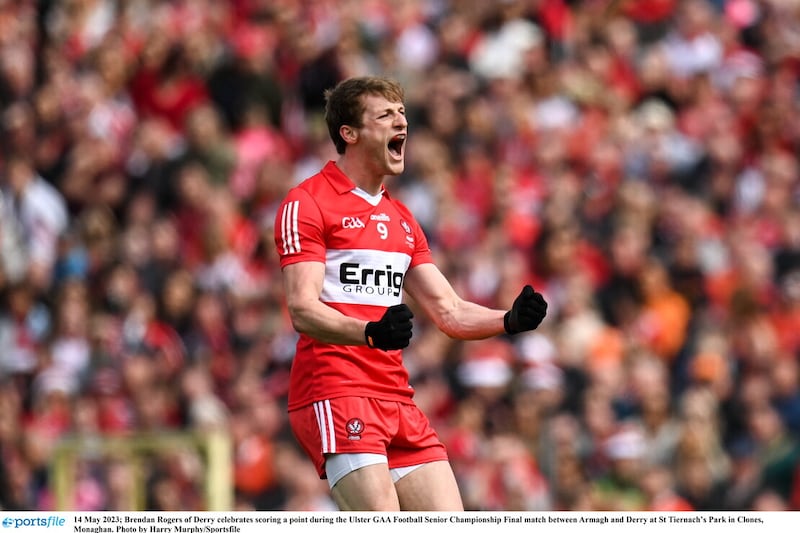THE mind and the mouth are hitting overdrive as Rory Woods leaves Dublin, the van finally northward bound just after half five on Monday afternoon, another day done at the Trinity College site he has overseen for Bennett Construction over the past few years.
Beating up the road, his head is still spinning from a day that started long before the sun showed its face.
A combination of that demanding work schedule, and three children under seven, has seen Woods take a step back from football. Aside from helping out with the Donaghmoyne U15s when he can, senior management ambitions have been placed on hold for the time being.
Yet the game still commands his thoughts on the drive home most evenings. As he clears the port tunnel, the events of the previous afternoon in Clones are still percolating. How Cavan left everything out on the field, the goals that killed them and the Michael Murphy shoulder that left Paddy Lynch seeing stars.
“He’s not the first man to come off the worse for wear against Murphy either.”
Donegal might already have their place in the Ulster final on May 29, but last Sunday’s victory over the Breffnimen left many – Woods included – with more questions than answers.
“Why do they not play Murphy on the edge of the square? I still think Donegal could do a lot better with him in there.
“I don’t think any of the other two would fear playing Donegal in an Ulster final. The hardest part might be getting there in the first place…”
That’s the challenge awaiting Derry and Monaghan at the Athletic Grounds tomorrow.
The Oak Leafs’ stunning destruction of All-Ireland champions Tyrone sent shockwaves through Ulster, leaving them slight favourites facing up to a Farney side who barely got out of third gear against beleaguered Down.
Tomorrow’s semi-final also marks a renewal of one of the Noughties’ most claustrophobic rivalries.
Armagh-Tyrone, Kerry-Tyrone, those were the games that defined a decade. Even for Derry, Monaghan and the rest of the chasing pack, Mickey Harte’s men were the big dogs, the scalp coveted above all others.
But as fate continually conspired to bring Derry and Monaghan together - resulting in five Championship meetings in five years between 2005 and ’09 - so antagonism grew, crescendoing each time the white line was crossed.
Before, with geography dictating that the real animus lay either side of their own county borders, there had been no real history to speak of. Certainly no rivalry anyway.
You had to go back to 1985 for Monaghan’s most recent Championship win, the years between giving way to the greatest generation of players Derry has ever produced while the Farney fed largely off scraps during a fallow time.
But towards the end of the 1990s, Woods was part of a minor side that included Tommy Freeman, Dick Clerkin, Eoin Lennon, Shane Duffy and Paul Finlay. Although they fell short, such a talented crop – allied to Monaghan’s 1999 Ulster U21 winners – showed green shoots were bursting through.
It wasn’t until Seamus McEnaney took over the senior reins in the autumn of 2004, however, that Monaghan really started to get serious.
He inherited a squad good enough to topple Joe Kernan’s Armagh the year after their All-Ireland triumph, but who were just as capable of blowing up with the odds were stacked in their favour.
“When I came in we had a serious bad culture of indiscipline,” said McEnaney in 2018.
“I remember years when you’d have had men drunk before games, they’d been out to maybe four or five in the morning. In some cases they wouldn’t even turn up.
“I met a few challenges that first year, quite a few challenges, but I dealt with them. I let a few players out the door.”
Just as he will tomorrow, ‘Banty’ led Monaghan into battle against Derry 17 years ago – his first Ulster Championship game proudly bearing the bainisteoir’s bib. But he did so without Woods.
Surviving the Corduff man’s cull was one thing, but escaping the clutches of a hardline GAA disciplinary system proved another matter entirely.
Five weeks before the counties would clash in Clones, they met on the same sod in a Division Two semi-final. Monaghan won, booking a Croke Park date with Meath, but it came at a cost when Woods was shown a red card for kicking out at Derry defender Kevin McGuckin 11 minutes in.
He was handed a three-month suspension and, upon appeal, had the dubious honour of being the first case heard by the GAA’s new Central Appeal Committee. It made no odds as Woods found himself sidelined for club and county until the end of July.
All these years on, that sorry episode still rankles.
“I went in to tackle one fella, and he [McGuckin] third man tackled me, I stuck out the foot and I tripped him. I got sent off any God’s amount of times in my career, and rightly so 99 per cent of the time probably, but that was a joke.
“You could’ve broke a boy’s jaw and you probably would’ve got a fortnight but if you swung out the leg, that’s what you got. I sat the whole summer out, wasn’t allowed to play for the club even… it was desperate really.
“The boys beat Meath, that was the first game we played in Croke Park, and I missed it. I didn’t even want to go to the game but I did in the end, Seamus insisted.
“I was disappointed more for my family and my dad than I was for myself. When you’re a young lad and he’s bringing you to matches, you don’t want to be missing days like that.”
Insult was added to injury when - inspired by 1-10 from Paddy Bradley - Mickey Moran’s Derry cruised across the line when Championship combat commenced in Clones.
And although Woods returned the week of the qualifier clash against Tyrone, the Farney were soon snuffed out by opponents with the scent of another All-Ireland title in their nostrils.
But by the time Monaghan next locked horns with Derry, and the Red Hands, two years down the line, McEnaney had added some insider knowledge to the mix. And if Tyrone could never quite be toppled, the simmering feud with the Oak Leafs was about to change course.
****************
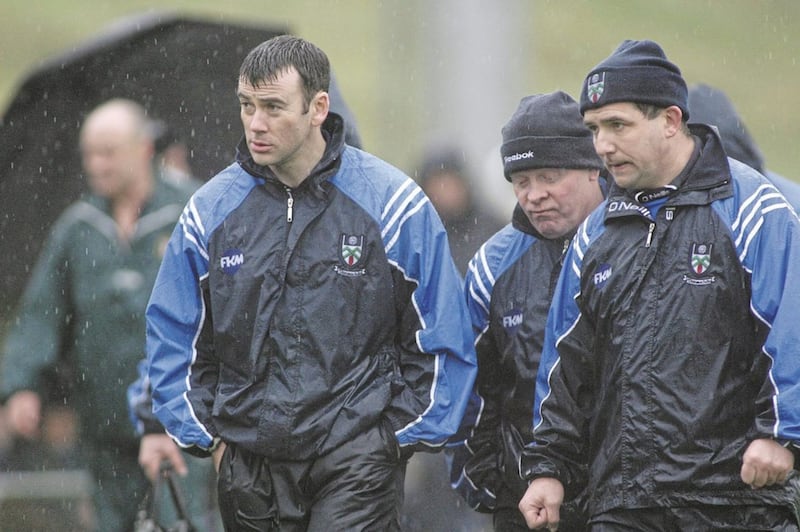
HAVING worked with the successful Tyrone underage teams of the late 1990s, and been Eamonn Coleman’s right hand man during a second stint in charge of his native Derry, trainer Martin McElkennon needed little talking up by the time he came on board in Monaghan.
McEnaney was a close friend of Coleman, who had always been glowing in his appraisal of McElkennon. To ‘Banty’, the Kildress man was the missing piece of the jigsaw.
“I needed to bring a Tyrone influence into my dressing room,” he said.
“Do you want to call it toughness? Hardness? Cynicism? Dark arts? Call it what you like, but I needed it.”
Woods wasn’t so sure. The game he knew and loved was facing into several stages of evolution, with a stats-driven arms race looming large on the horizon. Men of his strong, squat frame were once prized possessions but, as generations passed, had become an increasingly rare breed.
“Listen, if I’d the head screwed on, I should’ve been away playing rugby – it probably would’ve suited me better, but there was no rugby around here,” said Woods, who also hurled for Monaghan and was called into Ulster’s 2006 Railway Cup panel.
“Nowadays, absolutely not. I wouldn’t be anywhere near a county team, that’s just fact. Fourteen kilometres or whatever it is they’re covering in a game now… no way.
“I remember watching Mayo a few years ago and they took off Colm Boyle because his stat yoke was telling them he was tired. Do they not know the man he’s marking’s tiring as well?
“Imagine me with a yoke on me like they have these days… after the warm-up I’d nearly be tired. Look, I did struggle, but in some games it helped me too. I’d a good houl on me, and that first 15-20 yards, I would nearly match Tommy Freeman.
“The problem was after that, them other boys could keep on going. But where I played, around the edge of the D, it suited me.”
And from the day and hour he arrived, the new man had the burly playmaker in his sights.
“Rory was one of the first ones Seamus would’ve pinpointed,” said McElkennon, “this man has loads of ability, we need to get the best from him…”
McElkennon got started in November 2006, but by the time the following year’s Championship came around, Woods had barely touched leather.
Away from the collective training sessions, though, serious work was being done in a bid to harness what he had.
“You’d be going up to Marty at the crack of dawn, up to Cookstown, do your session then go to the pool. I was a carpenter at the time and I’d have to go and do my day’s work after. There was days I remember not being able to start the car – shaking, like…”
“Rory would’ve come up to me at the Glenavon [hotel] on a Wednesday and trained brilliantly,” says McElkennon.
“He definitely got fit, but Rory was unique and sometimes you have to just realise not everybody is going to be cut from the same cloth.
“Like, when the GPS systems came out around the end of the Noughties, we played a National League game and the guys running it, they were sitting with their laptops along the line.
“After 40 minutes they called me over and said ‘your number 11 didn’t do the same amount of running in the last 10 minutes of the first half and he’s done very little in the second half’.
“I went to McEnaney, ‘Rory’s running’s down’, so he sent a man to get warmed up. Next thing Rory Woods gets the ball, turns and beats one man, beats a second man and sticks it in the top corner of the net. McEnaney shouts over to me ‘tell them two boys with the laptops to close them right now’.
“People might have questioned Rory up until then, but in my time I never questioned Rory Woods. He’d have been my number 11 any day.”
That belief, and the trust established through the winter, worked both ways.
“Training-wise, it took me about six months sitting on the bench to cop on to what Marty was trying to do,” says Woods.
“He had us working really hard as a forward unit - the tackle, turnovers… Marty brought all that into Monaghan. What Tyrone were doing, Marty knew we had to do the same. It just took me a wee bit longer to see that.
“Before, Seamus would’ve always played me, even though I carried a bit of weight, but when we played Down in the Marshes in the first round of Ulster in ’07, I didn’t start. Either did Dermot McArdle or JP Mone.
“We were in the Hillgrove after, and ‘Strimmer’ [McArdle] says to me ‘don’t you be eating your dinner – we’re not f**kin’ sitting on the bench the next time’.
“The three of us headed out to ’Blayney’s ground, we started our training that evening; up and down the steps, flipping tyres at the bottom and then back up and down the steps.
“Against Derry the next day, all three of us started. Marty came to me before and said ‘you’re ready now’.”
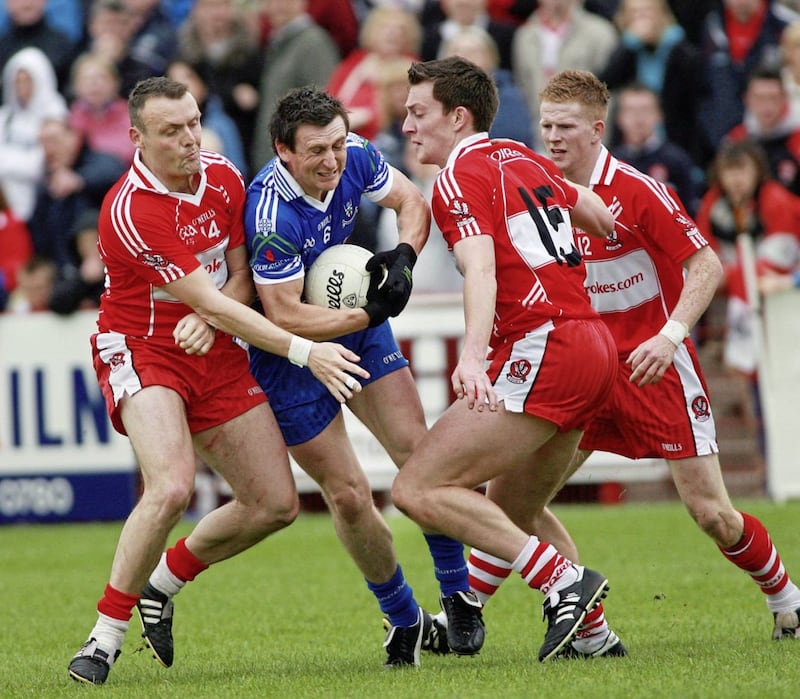
When that provincial semi-final rolled around, Derry’s dominance finally came to an end as Monaghan – without Paul Finlay, struck down by a virus days before - edged across the line, 0-14 to 1-9, at Casement Park.
“I remember sitting in the dressing room that day, and one of the boys standing up and saying ‘how long is this going to go on? Enough is enough. It stops today.’ And so it did....”
The balance of power had shifted – for now.
Monaghan maintained the upper hand with victory in a heated qualifier in Clones the following year, but the rivalry reached its peak – and, ultimately, its conclusion - in two bad-tempered encounters in 2009.
Now under Damian Cassidy, Derry – with 20-year-old James Kielt in top form - showed the kind of steel they had previously lacked in the face of the Farney’s physicality.
“There was off the ball stuff going on before the ball was even thrown in at Celtic Park.
“Derry gave it to us that day. We were after giving it to Derry for two years, and they came out to bully us. Conor McManus got kneed in the privates, Fergal Doherty, hard as nails, got sent off.
“There was a whole lot of stuff went on, but they did to us what we had done to them. No complaints. Then Joe Brolly goes on the TV that night and starts saying the Derry boys are great Gaels, where this Monaghan team…
“Ah, that would annoy you like.”
A banner bearing the inscription ‘Brolly is a tool’ found its way onto the terrace at Clones after the qualifier draw brought them together again seven weeks later.
But even talk of disarray in the Derry camp couldn’t stop them repeating the dose, with Paddy Bradley – after rumours he had left the panel earlier in the week, only to rejoin 24 hours later – the scourge of Monaghan again, bagging 2-8 in a one-sided victory.
“Even that morning there was talk he wasn’t going to tog out,” recalls Woods.
“It wasn’t a f**king match at all. We took the eye off the ball badly and they made us pay.”
Tomorrow, in the first Championship meeting between the counties since, the margin for error remains razor thin. Both are genuine provincial title contenders with even loftier aspirations long-term – the established force and the emerging upstarts.
“I don’t know whether, back then, Derry players couldn’t mingle, or they weren’t a tight unit.
“A lot of teams, man for man, they were probably better than us. But when Seamus came in, it became almost like a club environment.
“I never got that feeling with Derry. When you were getting on top of them, you could nearly see the heads start to go down, there’d be a bit of talking back to each other… as a team, you feed off that.
“For years there they never seemed to gel, but Rory Gallagher has got them tight now. That’s what makes them dangerous.”
The upper hand, and an Ulster final spot, awaits. It might not be the last time Derry and Monaghan collide in the years to come.
